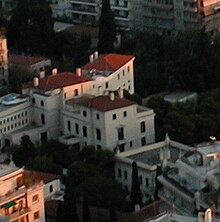|
American School of Classical Studies at Athens
The American School of Classical Studies at Athens (ASCSA; Greek: Αμερικανική Σχολή Κλασικών Σπουδών στην Αθήνα) is one of 19 foreign archaeological institutes in Athens, Greece. It is a member of the Council of American Overseas Research Centers (CAORC). CAORC is a private not-for-profit federation of independent overseas research centers that promote advanced research, particularly in the humanities and social sciences, with focus on the conservation and recording of cultural heritage and the understanding and interpretation of modern societies. General informationWith an administrative base in Princeton, New Jersey, and a campus in Athens, the American School of Classical Studies at Athens is one of the leading American research and teaching institutions in Greece, dedicated to the advanced study of all aspects of Greek culture, from antiquity to the present. Founded in 1881, the School is a consortium of nearly 200 colleges and universities in the United States and Canada. It was the first American overseas research center, and today it is the largest of the eighteen foreign institutes in Athens. It also provides the opportunity for students and scholars from around the world to explore the full range of scholarly resources in Greece. The American School operates excavations in the Athenian Agora and Ancient Corinth, two distinguished libraries, an archaeological science laboratory, and a publications department. The School remains, as its founders envisioned, primarily a privately funded, nonprofit educational and cultural institution. Governance The School's academic programs and research facilities are supervised by an academic advisory body known as the Managing Committee, which consists of elected representatives from a consortium of more than 190 North American colleges and universities. The Board of Trustees, composed of distinguished women and men from the world of business, law, philanthropy, and academia, is responsible for the management of the School's endowment, finances, and property, and has legal responsibility for the ASCSA. Archaeological projectsThe ASCSA has been involved in a large number of archaeological projects, as well as a major program of primary archaeological publications. It is responsible for two of the most important archaeological sites in Greece, the Athenian Agora and Ancient Corinth. The Corinth Excavations commenced in 1896 and have continued to present day with little interruption, and the Athenian Agora excavations first broke ground in 1932. At both sites, the ASCSA operates important museums and extensive facilities for the study of the archaeological record. Excavation records and artifacts are made available to wider audiences via ASCSA.net Affiliated projectsOther archaeological projects with ASCSA involvement, past and present, include surveys in the Southern Argolid, in Messenia and at Vrokastro (Crete) and excavations at Olynthus (Greek Macedonia), Samothrace (North Aegean), the islet of Mitrou (Central Greece), Halai (Phthiotis), Isthmia, Kenchreai, Nemea, Sicyon (all in Corinthia), Lerna, Argos, Franchthi cave and Halieis (Argolid), Mt. Lykaion (Acadia), Nichoria and the Palace of Nestor at Pylos (Messenia), Haghia Irini (Keos), as well as Azoria, Mochlos, Gournia, Kavousi and Kommos on Crete. PublicationsASCSA publishes the peer-reviewed journal Hesperia quarterly as well as monographs for final reports of archaeological fieldwork conducted under School auspices, supplements to Hesperia, Gennadeion monographs; and miscellaneous volumes relating to the work of the School. These books range in format from large hardbacks to slim paperback guides. List of directors
List of Assistant Directors
List of alumniDoreen Canaday Spitzer (1936 to 1938) Bibliography
External links
|
||||||||||||||||

